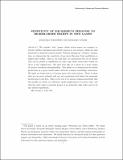Sensitivity of equilibrium behavior to higher-order beliefs in nice games
Author(s)
Weinstein, Jonathan; Yildiz, Muhamet
DownloadYildiz_Sensitivity of.pdf (618.6Kb)
PUBLISHER_CC
Publisher with Creative Commons License
Creative Commons Attribution
Terms of use
Metadata
Show full item recordAbstract
We analyze “nice” games (where action spaces are compact intervals, utilities continuous and strictly concave in own action), which are used frequently in classical economic models. Without making any “richness” assumption, we characterize the sensitivity of any given Bayesian Nash equilibrium to higher-order beliefs. That is, for each type, we characterize the set of actions that can be played in equilibrium by some type whose lower-order beliefs are all as in the original type. We show that this set is given by a local version of interim correlated rationalizability. This allows us to characterize the robust predictions of a given model under arbitrary common knowledge restrictions. We apply our framework to a Cournot game with many players. There we show that we can never robustly rule out any production level below the monopoly production of each firm.
Date issued
2010-07Department
Massachusetts Institute of Technology. Department of EconomicsJournal
Games and Economic Behavior
Publisher
Elsevier
Citation
Weinstein, Jonathan, and Muhamet Yildiz. “Sensitivity of Equilibrium Behavior to Higher-Order Beliefs in Nice Games.” Games and Economic Behavior 72, no. 1 (May 2011): 288–300.
Version: Author's final manuscript
ISSN
08998256
1090-2473